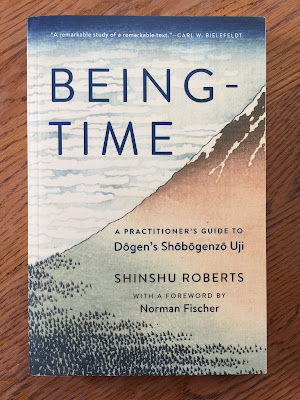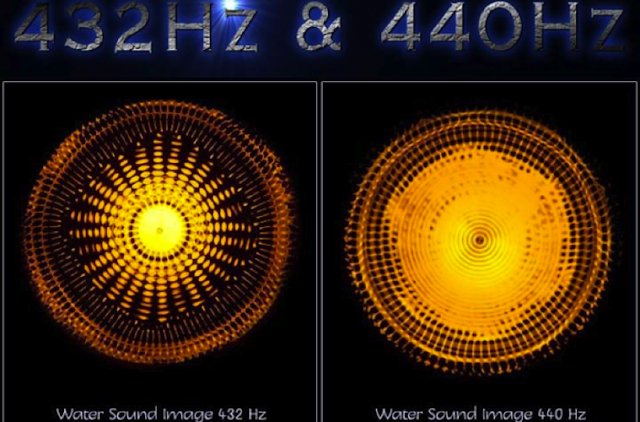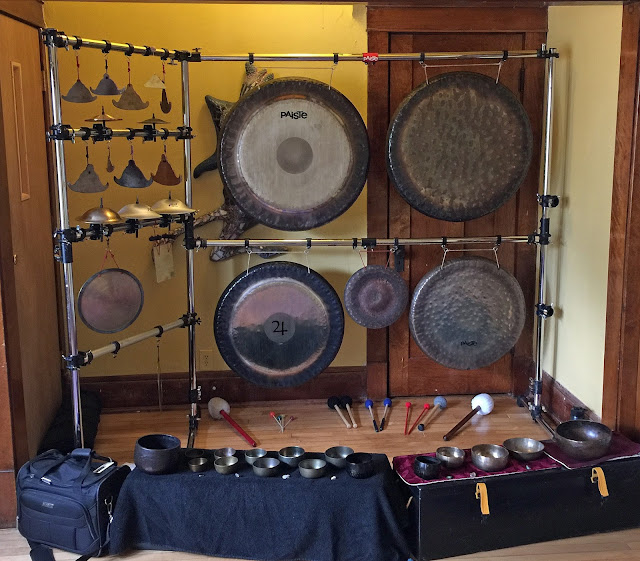The Fluidity of Time & Space - 3
Grab a cuppa and relax, as we are going deep in this blog…
Defining Time
Time. It's such an interesting concept. On one hand, we are so tied into it - clock time. On the other hand, we can experience a point where it doesn't exist - no time. Like when we get engaged in an activity so deeply that we lose our sense of time. We finally finish that project we were working on, look at the clock, and realize that 4 hours have passed. But it didn't seem like 4 hours. It really didn't seem like anything. We were engaged in the activity and not aware of time - there was no time. Another example is, after I finish a Meditation Session, where I've just played for 60-70 minutes, and people comment that, “It seemed like it was only 10 minutes.”
We can also experience the opposite, where time seems to drag on forever, like when we are waiting for an appointment, or at a shopping checkout, or when we are doing an activity we are not engaged in. There is a sense of elongated time, time stretching out and pulling us with it. We become anxious, we tense up.
Both of these are real to us. But if time is time, how can this be? Like everything else in the Universe, time is fluid. It is not a fixed, static concept. We can actively manipulate it by changing how we sense/acknowledge/react to it in our minds.
One of the goals of various types of meditation systems, mystical societies, and Eastern religions, is to free us from being controlled by time. Think of meditation, where the idea is to exist in the moment, the now—not in any possible future, nor in any past, but the now. And by existing in the moment, we are free from any sort of attachment to time.
For those interested in looking into this idea of time and no-time further, I recommend the recent book, BEING-TIME, by Shinsu Roberts. It is a look at one of the most famous Buddhist texts, the Shōbōgenzō Uji by the great Zen Master, Dōgen. It's an intense, but rewarding read that can help open up your sense of time.
Working With Time
When I am playing the Gongs/Bowls/Bells for others, I am actively engaged in changing their perception of time. Everyone comes to the session rigidly adhering to clock time. I want to free them from that, giving them a time out, a chance to step out of their normal time stream and relax in the moment.
I do this in various ways, working with pulses and moving towards creating a sense of no time. (see Part 2 of this blog series for exercises in freeing yourself, as the player, from clock time.) Let's look at some of these ways I perceive different aspects of time:
Instrument Pulse
Each instrument I have has its own pulse. I strike one and can hear/sense it going wa-wa-wa-wa as the sound reverberates. I use this as the timing for what I am playing at that moment. wa-wa-wa-wa becomes 1-2-3-4 as I follow the pulse, counting as in Part 2's exercises. Some instruments have a fast pulse, some a slow one, and some even have multiple pulses depending on the pitch/sound made.
When I play my copper clad iron bells, the 2nd one on the left is the time keeper. It emits a very strong wa-wa-wa-wa/1-2-3-4 pulse when I strike it. Whatever rhythms/melodies I play on these bells are always based on the pulse of the 2nd bell.
Similarly, when I play my 2 Drilbu Bells with a wand, like a singing bowl, they each have a 4 beat per revolution pulse. I follow that pulse and work with it.
With the very heavy Paiste Bell Chime, It rings out in one long tone for over 5 minutes. I am able to create and control the tempo of a pulse by waving my hand over the cymbal. This lets me start fast, then slow things down.
It's the same with the large Gongs. When struck in the center, each one has its own pulse. I use these pulses for timing/counting, as in Part 2.
Heart Pulse
I feel my own internal rhythms, like my heart, and base what I play off of that.
Breath Pulse
I listen to my breathing. Unlike my heartbeat, I have a great deal of control over the pulse of my breathing. I actively work to slow my breathing down, to calm myself and my mind in the process. This allows me to transfer that sense of calm to others. This also helps when adrenalin kicks in for some reason, often from an outside influence, such as a stray sound or noise, like trains, traffic, people yelling, etc. I can also be subject to not paying attention and being lost in the zone, where everything I play speeds up. I have found it important to stay grounded and aware of where I am feeling time in relationship to everyone else.
Often, because I am in a space of no time, everything that I play seems very slow and wide, yet to the outside world, it might be fast. It can also happen that I feel something is moving by quickly, when in the world of clock time, it is crawling by. This sort of altered sense of time requires the player to develop a sense of awareness, especially for where the people listening are in their time sense, in relationship to where the player is. This is one of those things that cannot be taught as much as learned through experience. As I tell people, while I may have 1 foot in no-time, I need to keep the other foot grounded in order to not be lost in time.
Arcs Of Time
In the diagram below, I've drawn out 5 different arcs. Each one represents a different time frame (as in Part 2's exercises). The idea here is that we want to start out playing/thinking/feeling #1, then move through each one sequentially, elongating our time frame/sense with each one. This is not an exact science, being much more an intuitive thing, sensing out every move or change.
And it's not just in one direction. I move freely, forwards and backwards, through these different arcs, sensing what is needed for each moment. But my ultimate goal is to reach some point where things move beyond these arcs into no-time. I let things be there for a while, then gradually move back into time. Again, this is an intuitive sense I've developed over the past 40+ years, through both my work as a professional percussionist, and as a practitioner of various mystical arts. I've done my home work. I've put in a lot of time. You don't just say, “I'm going to manipulate time”, any more than you would one day decide to become a pro athlete without following any sort of progression to get there.
The purpose of these 3 blogs is to at least make you aware of there being more than just clock time. It is up to you how much you want to delve into actively experiencing time in different ways, and if so, how much effort you want to put into it.
How Do You Experience Time?
Please comment on your own experiences with time below.
~ MB
Defining Time
Time. It's such an interesting concept. On one hand, we are so tied into it - clock time. On the other hand, we can experience a point where it doesn't exist - no time. Like when we get engaged in an activity so deeply that we lose our sense of time. We finally finish that project we were working on, look at the clock, and realize that 4 hours have passed. But it didn't seem like 4 hours. It really didn't seem like anything. We were engaged in the activity and not aware of time - there was no time. Another example is, after I finish a Meditation Session, where I've just played for 60-70 minutes, and people comment that, “It seemed like it was only 10 minutes.”
We can also experience the opposite, where time seems to drag on forever, like when we are waiting for an appointment, or at a shopping checkout, or when we are doing an activity we are not engaged in. There is a sense of elongated time, time stretching out and pulling us with it. We become anxious, we tense up.
Both of these are real to us. But if time is time, how can this be? Like everything else in the Universe, time is fluid. It is not a fixed, static concept. We can actively manipulate it by changing how we sense/acknowledge/react to it in our minds.
One of the goals of various types of meditation systems, mystical societies, and Eastern religions, is to free us from being controlled by time. Think of meditation, where the idea is to exist in the moment, the now—not in any possible future, nor in any past, but the now. And by existing in the moment, we are free from any sort of attachment to time.
For those interested in looking into this idea of time and no-time further, I recommend the recent book, BEING-TIME, by Shinsu Roberts. It is a look at one of the most famous Buddhist texts, the Shōbōgenzō Uji by the great Zen Master, Dōgen. It's an intense, but rewarding read that can help open up your sense of time.
When I am playing the Gongs/Bowls/Bells for others, I am actively engaged in changing their perception of time. Everyone comes to the session rigidly adhering to clock time. I want to free them from that, giving them a time out, a chance to step out of their normal time stream and relax in the moment.
I do this in various ways, working with pulses and moving towards creating a sense of no time. (see Part 2 of this blog series for exercises in freeing yourself, as the player, from clock time.) Let's look at some of these ways I perceive different aspects of time:
Instrument Pulse
Each instrument I have has its own pulse. I strike one and can hear/sense it going wa-wa-wa-wa as the sound reverberates. I use this as the timing for what I am playing at that moment. wa-wa-wa-wa becomes 1-2-3-4 as I follow the pulse, counting as in Part 2's exercises. Some instruments have a fast pulse, some a slow one, and some even have multiple pulses depending on the pitch/sound made.
When I play my copper clad iron bells, the 2nd one on the left is the time keeper. It emits a very strong wa-wa-wa-wa/1-2-3-4 pulse when I strike it. Whatever rhythms/melodies I play on these bells are always based on the pulse of the 2nd bell.
Similarly, when I play my 2 Drilbu Bells with a wand, like a singing bowl, they each have a 4 beat per revolution pulse. I follow that pulse and work with it.
With the very heavy Paiste Bell Chime, It rings out in one long tone for over 5 minutes. I am able to create and control the tempo of a pulse by waving my hand over the cymbal. This lets me start fast, then slow things down.
It's the same with the large Gongs. When struck in the center, each one has its own pulse. I use these pulses for timing/counting, as in Part 2.
Heart Pulse
I feel my own internal rhythms, like my heart, and base what I play off of that.
Breath Pulse
I listen to my breathing. Unlike my heartbeat, I have a great deal of control over the pulse of my breathing. I actively work to slow my breathing down, to calm myself and my mind in the process. This allows me to transfer that sense of calm to others. This also helps when adrenalin kicks in for some reason, often from an outside influence, such as a stray sound or noise, like trains, traffic, people yelling, etc. I can also be subject to not paying attention and being lost in the zone, where everything I play speeds up. I have found it important to stay grounded and aware of where I am feeling time in relationship to everyone else.
Often, because I am in a space of no time, everything that I play seems very slow and wide, yet to the outside world, it might be fast. It can also happen that I feel something is moving by quickly, when in the world of clock time, it is crawling by. This sort of altered sense of time requires the player to develop a sense of awareness, especially for where the people listening are in their time sense, in relationship to where the player is. This is one of those things that cannot be taught as much as learned through experience. As I tell people, while I may have 1 foot in no-time, I need to keep the other foot grounded in order to not be lost in time.
Arcs Of Time
In the diagram below, I've drawn out 5 different arcs. Each one represents a different time frame (as in Part 2's exercises). The idea here is that we want to start out playing/thinking/feeling #1, then move through each one sequentially, elongating our time frame/sense with each one. This is not an exact science, being much more an intuitive thing, sensing out every move or change.
The purpose of these 3 blogs is to at least make you aware of there being more than just clock time. It is up to you how much you want to delve into actively experiencing time in different ways, and if so, how much effort you want to put into it.
How Do You Experience Time?
Please comment on your own experiences with time below.
~ MB
Chop Wood / Carry Water / Play Gongs™
Your donations help keep these blogs going. Thank You ~ MB.





Comments
Post a Comment